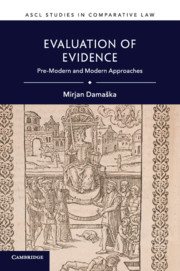Crossref Citations
This Book has been
cited by the following publications. This list is generated based on data provided by Crossref.
Tersago, Pieter
Vanderhallen, Miet
Rozie, Joëlle
and
McIntyre, Sara-Jane
2020.
From Suspect Statement to Legal Decision Making.
Zeitschrift für Psychologie,
Vol. 228,
Issue. 3,
p.
175.
Villa-Flores, Javier
2020.
A remedy and a poison: perjury and trust in Bourbon Mexico.
Colonial Latin American Review,
Vol. 29,
Issue. 3,
p.
495.
Vladár, Vojtech
2021.
Dôležitosť dekretálie ut fame pápeža Inocenta III. pre rozvoj trestného práva.
p.
129.
Bartkus, Jurgis
2022.
The Concept of the Admissibility of Evidence in Lithuanian Civil Procedure and Arbitration.
Teisė,
Vol. 122,
Issue. ,
p.
51.
Vladár, Vojtech
2023.
Purgatio canonica in Medieval Canon Law.
Studia theologica,
Vol. 25,
Issue. 2,
p.
73.
Buchnik, Esther
Ariel, Barak
Domb, Avi
Treves, Nir
and
Gafny, Ron
2023.
The role of DNA in criminal indictments in Israel.
Journal of Forensic Sciences,
Vol. 68,
Issue. 5,
p.
1755.
Greengrass, Mark
and
Hamilton, Tom
2024.
Gaspard de Monconys’ Defence against the Charge of Imposture: Criminal Justice, Social Hierarchy, and Personal Identity in Early Seventeenth-Century France.
The Seventeenth Century,
Vol. 39,
Issue. 4,
p.
511.



